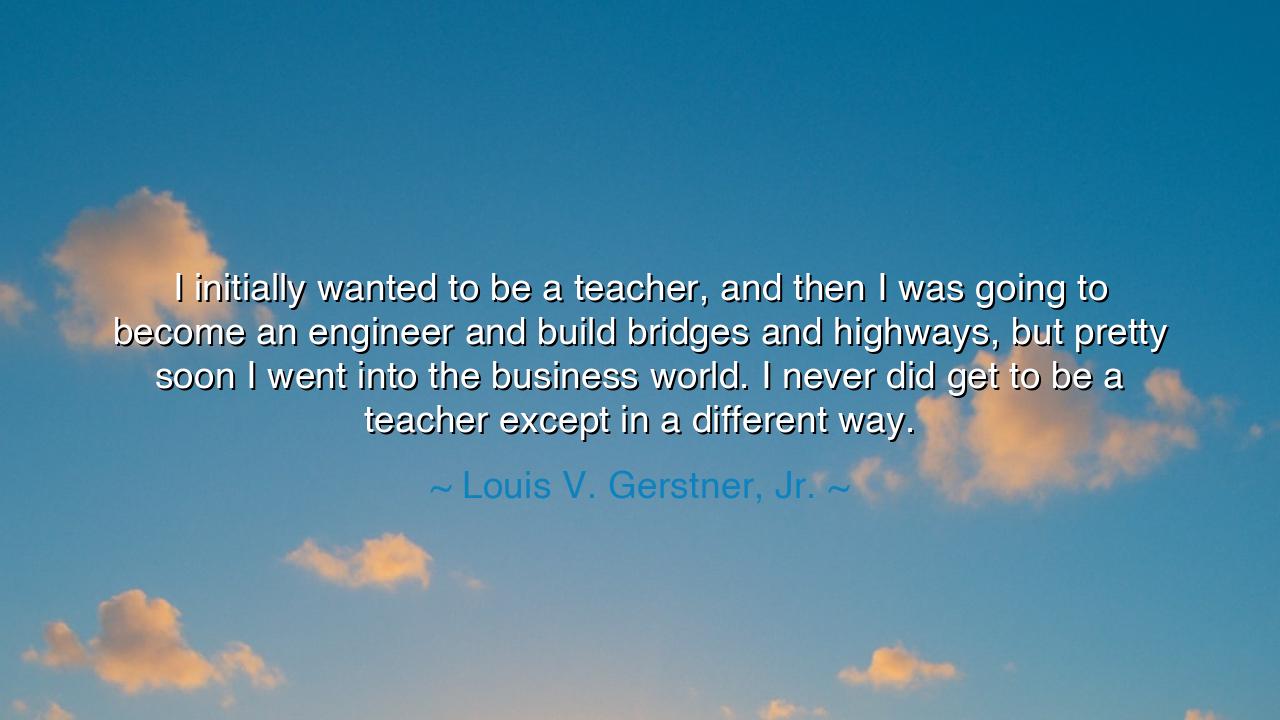
I initially wanted to be a teacher, and then I was going to
I initially wanted to be a teacher, and then I was going to become an engineer and build bridges and highways, but pretty soon I went into the business world. I never did get to be a teacher except in a different way.






Louis V. Gerstner, Jr., the man who once stood at the helm of IBM and led it through peril into renewal, confessed with humility: “I initially wanted to be a teacher, and then I was going to become an engineer and build bridges and highways, but pretty soon I went into the business world. I never did get to be a teacher except in a different way.” These words reveal the winding path of vocation, and the truth that one’s deepest calling often finds expression in unexpected forms. Though his life did not follow the exact course he had envisioned, the essence of his desire—to build, to guide, to instruct—found its way into his work in another fashion.
The origin of this thought lies in Gerstner’s youth, when he dreamed first of teaching, then of engineering, of building bridges and highways—symbols of connection and progress. Yet fate led him into the world of commerce, where he eventually became a leader renowned for saving a company many believed doomed. Looking back, he saw that though he never became a teacher in the classroom, his leadership itself became a form of teaching, for through it he inspired, directed, and cultivated the growth of others.
History is full of such transformations. Consider Marcus Aurelius, destined to be emperor, who longed to be a philosopher. Though he never became a cloistered teacher of wisdom, his role as emperor did not silence his philosophy; rather, it transformed it. His Meditations, written in the quiet of military campaigns, became lessons for generations to come. Like Gerstner, he never abandoned the essence of his dream—he simply lived it in a different way.
The meaning here is profound: our calling is not always about form, but about essence. A teacher is not only one who stands before a classroom; a teacher is one who imparts wisdom, who guides others toward growth, who opens the eyes of those in their care. By this measure, Gerstner was a teacher indeed, though his classroom was the boardroom and his students were the men and women of his organization. In the same way, the builder is not only the engineer with blueprints, but also the leader who constructs bridges of trust, highways of opportunity, and pathways of innovation.
The lesson is both emotional and heroic: do not despair if life leads you away from the exact road you once envisioned. The spirit of your dream may still live on, transformed into something new. The world may need you not where you planned to be, but where your gifts find their highest purpose. To cling too tightly to form is to miss the essence; to recognize essence is to discover that your true calling will always find a way.
Real life shows us this again in the story of Nelson Mandela. He longed in his youth simply to be a lawyer, to fight injustice through courts and laws. Instead, destiny carried him through the fire of imprisonment, and he emerged not as a lawyer but as a liberator, a teacher to his people and to the world. His dream of justice was fulfilled—not as he first imagined it, but in a grander, more universal way. So too with Gerstner: though he never wore the mantle of “teacher” as title, he lived it as vocation.
Practically, this wisdom calls us to embrace flexibility in our own lives. Ask yourself: what is the essence of my dream? If I wished to teach, then let me teach in whatever sphere life places me. If I wished to build, then let me build—whether of stone, of ideas, or of communities. If I wished to heal, then let me heal—in the hospital, in the family, or in the quiet encouragement of a friend. The form may change, but the essence endures.
Thus, Gerstner’s words remind us: our true calling will never be lost, only reshaped. To teach, to build, to lead—these are not confined to titles or roles, but are woven into the very fabric of how we live. Let us then live our vocations fully, in whatever arena life places us, so that when we look back, we may say: “I did not become what I first dreamed—but I became what I was meant to be.”






AAdministratorAdministrator
Welcome, honored guests. Please leave a comment, we will respond soon